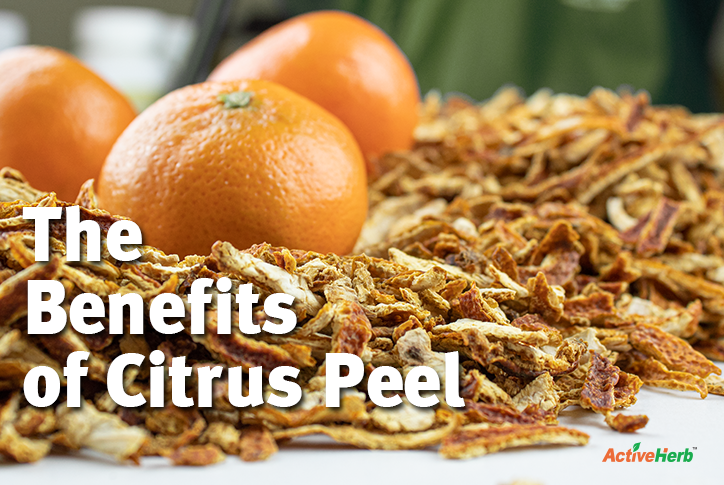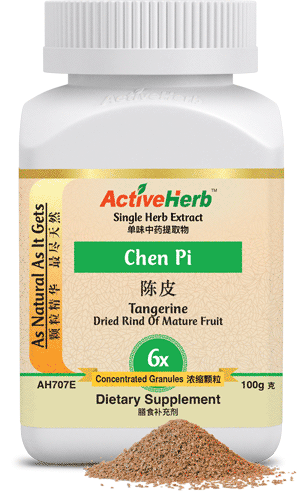These Herbs Have Tons of AP’PEEL’ in TCM

After reading about citrus peel benefits in TCM, you’ll think twice before discarding the rind.
What do you think of when it comes to citrus fruits? Orange juice for breakfast. refreshing, vitamin C-rich snack in the summer. And, well, that’s pretty much about it for most people.
And when it comes to the peels of citrus fruit, in the West, they’re usually discarded. The lone exception being the rinds of lemons in cooking (lemon zest). But for centuries, citrus peels have been used as medicine in the Far East.
Let’s learn about the benefits of citrus peel in TCM.
Citrus Peel in TCM: What Does It Do?
Why on earth would anyone want to bite into a highly-bitter piece of citrus rind to support health? Well, thankfully, instead, we can take formulas that contain citrus peel or even single-herb extract granules, including:
-
Chen Pi – Mature Dried Tangerine Peel
-
Qing Pi – Immature Dried Tangerine Peel
-
Ju Hong – Red Tangerine Peel
- Zhi Qiao (Bitter Orange Peel)
But what would be the benefits of taking TCM citrus peel herbs?
In TCM, mature citrus peels like Chen Pi support Lung and Spleen organ system function (which is different from the physical organs of Western anatomy). In these organ systems, Chen Pi helps resolve Qi stagnation.
Have you ever eaten a huge holiday meal and feel that for the next few days, your digestive system is backed up? If so, then you can relate to Qi stagnation. Only with Qi stagnation, it takes more than one episode of indulgence to manifest. In other words, Qi stagnation is more of a constant than a temporary condition.
When you have Qi stagnation, it means that there are blockages in the body’s internal energy superhighway system (the meridians). And along the meridians are your physical organs. Consequently, organs such as the Liver, Spleen, Stomach, and Lungs will accumulate dampness. Over time, this dampness will create phlegm. And when the organs have phlegm, they will no longer function at their peak potential.
Moreover, Qi stagnation doesn’t just affect the body physically. This TCM pattern can also negatively affect the emotions.
Thus, by drying dampness, Chen Pi may help transform the phlegm that accumulates in the organs into an innocuous bodily fluid. And in doing so, mature tangerine peel may help you feel more emotionally well-balanced.
Chen Pi in TCM: Uses
People who may benefit most from Chen Pi include those with digestive problems such as gas and bloating. This is because Chen Pi resolves Qi stagnation in the Spleen. The Spleen is the TCM organ responsible for taking the nutrients from the Stomach and transforming them into Qi. This Qi is ultimately dispersed throughout the body.
If the Spleen organ system is hindered by Qi stagnation, digestion will suffer. And when the Lungs have Qi stagnation, the result can be shortness of breath, coughing and wheezing. In TCM theory, Chen Pi may be able to resolve these concerns because it also is said to resolve Qi stagnation in the Lung organ system.
Immature Citrus Peel in TCM
The older the peel, the better? Well, not necessarily. In TCM, immature citrus peel (Qing Pi ) is also used, albeit for different reasons. The main difference between Chen Pi (mature) and Qing Pi (immature) is that the latter acts on different channels. Specifically, Qing Pi influences the Gallbladder, Liver and Stomach.
So what’s the effects of immature vs. mature citrus peel? In TCM, Qing Pi immature peel resolves cases of more problematic food retention and abdominal distention as well as discomfort under the ribs. In addition, Qing Pi is used to support Liver function.
Red Tangerine Peel
Ju Hong, aka red tangerine peel is another TCM citrus peel that supports digestive function. Ju Hong is made from the outermost layer of the peel and supports the Lung and Spleen organs.
ActiveHerb.com offers several formulas that support digestion by nourishing Spleen function including SpleenVigor.
Spleen Vigor features Chen Pi and over a dozen TCM time-tested herbal ingredients.
BloatEase is another ActiveHerb.com digestive health formula with citrus peel, featuring Zhi Qiao, aka bitter orange peel.






